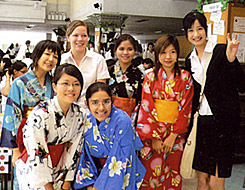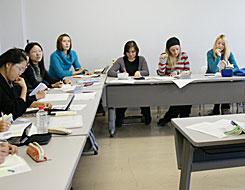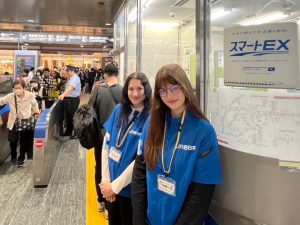Global exchange
Studying overseas
The biggest merit of studying abroad is that you can spend a certain period of time in an environment completely different from Japan while still being a student, and learn while experiencing differences in cultural backgrounds and values. Not only will you gain new knowledge, but it will also be a good opportunity to re-examine Japanese society from a new angle and reaffirm your student life in Japan. Many of the faculty members of the Faculty of Letters have experience in studying abroad, overseas training, and overseas research, so we support students’ overseas experience in various ways.
Study Abroad under the Okayama University Short-term Study Abroad Program (EPOK)

At Mahidun University in Thailand, a part of EPOK, there was an exchange meeting between international students and those who have studied abroad in Japan
Currently, Okayama University has student exchange agreements, including tuition waiver, with partner universities in the United States, Canada, England, Germany, Italy, France, Belgium, Poland, the Netherlands, Australia, Thailand, Malaysia, the Philippines, Taiwan, China and Korea. Students can study abroad at these universities through the One-Year Short-Term Study Abroad Program (EPOK). As long as you pay your tuition fees to Okayama University, you will be exempted from tuition fees at the partner universities.
Okayama University Short-term Study Abroad Program (EPOK) [Japanese]
Study Abroad under an Exchange Agreement between Departments
Through interdepartmental exchange agreements, 25 international students from universities around the world were accepted and 10 students were sent abroad in FY2023. In addition, 21 students were sent to summer school, and in a specialized course called “Intercultural Experience,” which began in FY2023 to visit partner universities overseas, a total of 21 students participated in Kookmin University in Korea and Kasetsart University in Thailand, all totaling 52 students sent abroad as a university event. International exchange at the Faculty of Letters will become increasingly active in the future.
In addition, there are university-wide programs at the University of Adelaide (Australia), Portland State University (USA), University of Victoria (Canada), University of York (UK), Sungkyunkwan University (Korea), Jilin University (China), and others. Several students from our faculty also participate in the program each year.
In addition, a new class called “Cross-Cultural Experience” has been offered since the 2023 academic year. Members of the Faculty of Letters lead students to partner universities for exchanges on an irregular basis, with the aim of giving the students a chance to gain experience abroad.
Language Training Program
Privately funded language training programs include a foreign language acquisition / study abroad program in Chinese (Beijing Language and Culture University) and a German summer school (Trier University, Germany), which are conducted mainly by faculty members of the Faculty of Letters. University- wide programs are available at the University of Adelaide (Australia), Portland State University (USA), Victoria University (Canada), the University of York (UK), Seiseikan University (Korea), Jilin University (China), etc. Several students from the Faculty of Letters also participate every year.
Okayama University Overseas Language Training Program
International Exchange on Campus

Japanese language class for international students
The number of international students studying at the Faculty of Letters in FY2023 is 8 undergraduate students, 13 exchange students, and 22 students scheduled to enter in October. They come from a wide variety of countries, including China, Korea, Taiwan, Kyrgyzstan, Norway, Cambodia, Thailand, Germany, France, Russia, Serbia, and Laos. Many students from more diverse countries are enrolled in the graduate school, where they are working hard on their specialized research and interacting with younger undergraduate students. There are various types of international students, such as long-term students studying and researching at undergraduate and graduate schools to obtain degrees, studying Japanese language and Japanese affairs, and short-term students studying abroad. They are also to share firsthand information about their home countries with Japanese students. Through the university-wide support system for international students and the activities of the international student volunteers in our faculty, a circle of exchange among students is growing.
Study Abroad Program at Okayama Unibersity
There are two ways to study at Okayama University: as a regular student from abroad or by participating in one of the various study abroad programs. For details, please refer to the following links.
Report by Teodora Danilovic / University of Belgrade
(Studied at Okayama University Faculty of Letters for one year from October 2023)
 I came to Okayama University at the start of my 4th year, in October 2023. It was my first time ever visiting Japan, and I was impressed by how peaceful yet fun Okayama is. I thought that the paperwork would be difficult, but with the help of my tutor, supervisor and many other kind people, I settled into Okayama faster than expected.
I came to Okayama University at the start of my 4th year, in October 2023. It was my first time ever visiting Japan, and I was impressed by how peaceful yet fun Okayama is. I thought that the paperwork would be difficult, but with the help of my tutor, supervisor and many other kind people, I settled into Okayama faster than expected.
In the first semester, I mostly took Japanese language classes to focus on improving my Japanese. As I was placed in Level 7, most of my classmates were graduate students and Japanese students who lived abroad. It gave me many opportunities to talk to native speakers, which I didn’t have before. In Japanese language classes I had the opportunity to apply my knowledge, broaden my vocabulary and learn to express myself more naturally. In just one semester, I became able to write long reports and read 600-page novels in Japanese, which were always my biggest goals.
In the second semester, I started taking courses from the Department of Letters, where I got to learn more about linguistics, teaching Japanese as a second language and first-language acquisition in Japanese children. It was fun to talk about Japanese language with both a native speakers’ and foreign learners’ perspective.
Even though I tried to take as many classes as possible, I also had time to travel during breaks and weekends. In just six months, I was able to travel to 12 different prefectures, as well as many small cities and islands in Okayama prefecture. I also made friends from all over the world, so I never felt alone. One experience that was particularly meaningful to me was when, as part of a class, nine of us international students did an internship in JR West Japan. During the Golden Week period, we did interpretation in JR Okayama station for foreign tourists, and we even made station-wide announcements in English. Thanks to all the experience I got in Okayama University, I got to learn not only a lot of professional knowledge, but also understand Japanese traditional culture and modern society.
